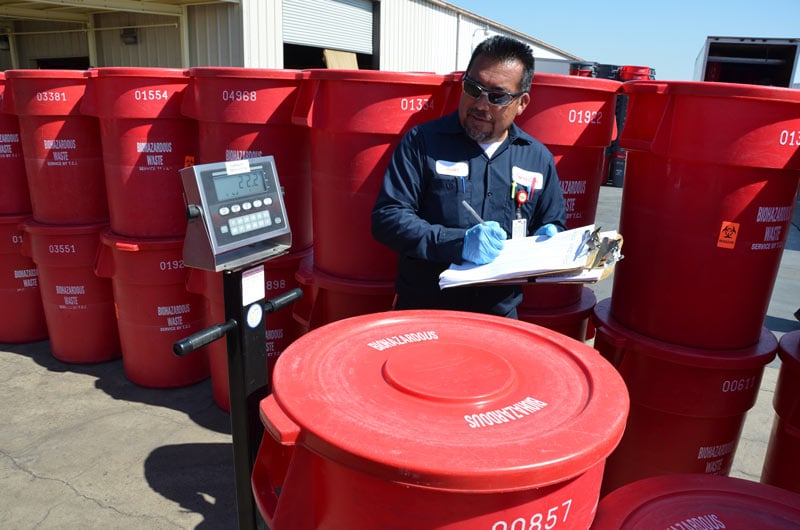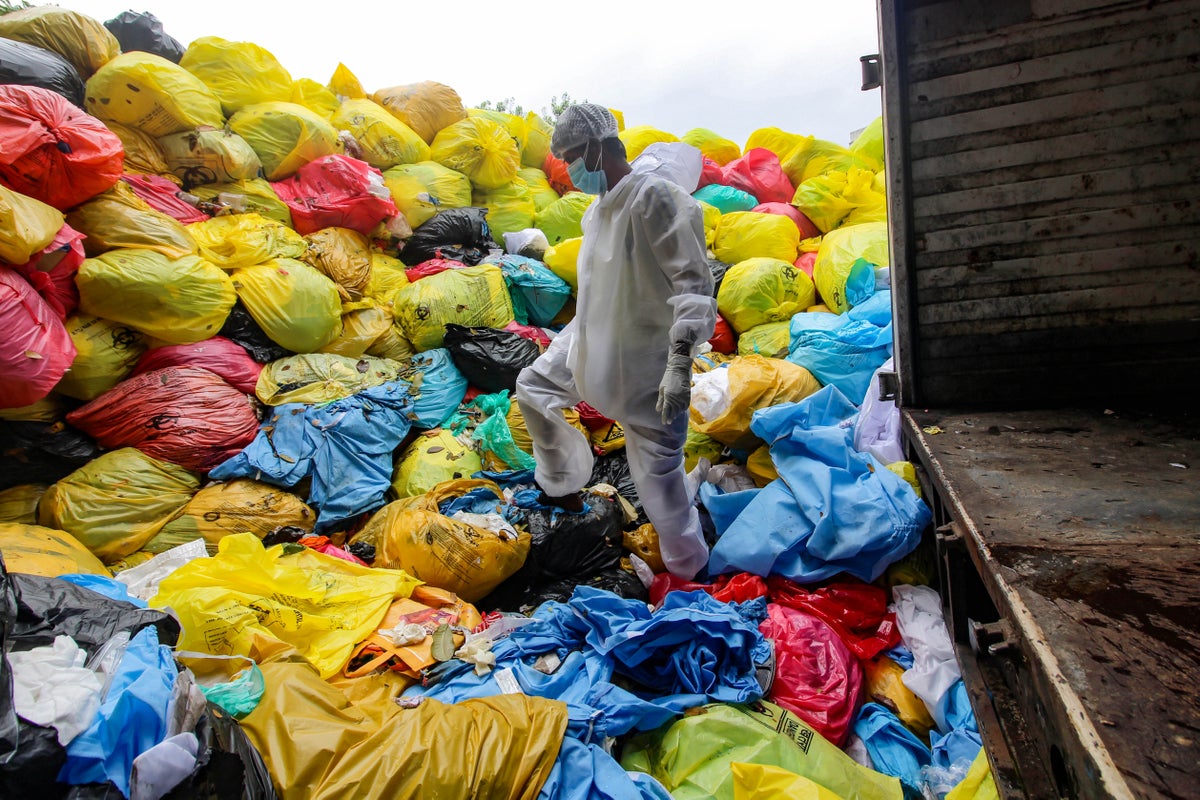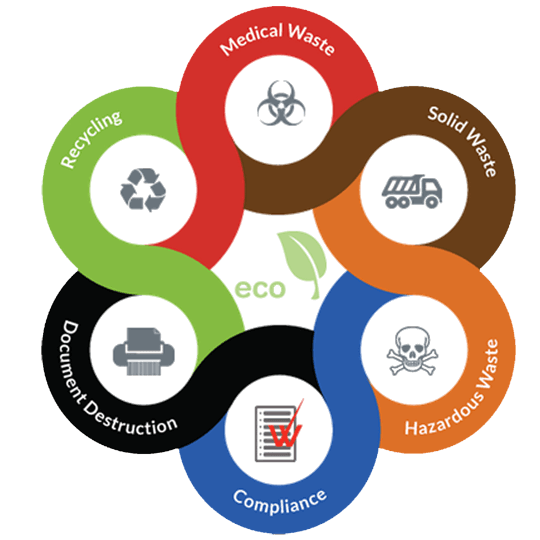Expert Medical Waste Disposal Service: Protecting Your Facility and Community
Wiki Article
Making Certain Safe Handling and Disposal of Medical Waste
Making sure risk-free handling and disposal of clinical waste is of paramount significance in medical care setups. Improper management of clinical waste can posture substantial threats to the environment, public health and wellness, and health care employees. This requires adherence to rigorous guidelines and procedures for its safe handling and disposal. In this introduction, we will check out the relevance of proper clinical waste management, the threats related to improper handling and disposal, in addition to the guidelines and techniques that can be executed to guarantee its secure disposal. Furthermore, we will review the relevance of training and education for medical care experts in order to preserve a tidy and secure healthcare setting. By following these practices, we can properly minimize the prospective threats connected with medical waste.Importance of Proper Medical Waste Monitoring
Proper clinical waste management is of utmost relevance in guaranteeing the safety and security and well-being of healthcare experts, clients, and the public. Medical waste refers to any kind of waste created by health care centers during the diagnosis, treatment, or booster shot of people or pets. This waste can pose significant health and wellness dangers otherwise handled and disposed of effectively.
Among the primary reasons proper medical waste management is vital is to stop the spread of transmittable diseases. Clinical waste, such as utilized needles, infected dressings, and biological materials, can bring unsafe pathogens. If not taken care of and dealt with appropriately, these virus can be transmitted to health care workers, clients, waste handlers, and even the public, bring about the potential episode of conditions.
Additionally, proper medical waste administration helps safeguard the atmosphere - medical waste disposal service. Clinical waste contains unsafe materials, including chemicals, pharmaceuticals, and contaminated materials. When not handled suitably, these compounds can contaminate dirt, water bodies, and the air, posing a significant danger to ecological communities and public health and wellness
In addition, reliable medical waste monitoring guarantees conformity with neighborhood laws and worldwide requirements. Federal governments and regulative bodies have established standards and protocols to guarantee the secure handling, storage space, transportation, and disposal of clinical waste. Complying with these policies is necessary to avoid lawful effects and keep the reputation and credibility of healthcare centers.
Risks of Improper Handling and Disposal

If clinical waste is not effectively disposed of,Individuals can likewise be revealed to these transmittable illness. For example, if contaminated needles or other sharps are not taken care of in marked puncture-proof containers, they may mistakenly puncture people, leading to prospective infections. Furthermore, if clinical waste is not segregated effectively, there is a threat of cross-contamination in between different types of waste, more enhancing the chances of condition transmission.
Incorrect disposal of clinical waste can likewise have damaging effects on the atmosphere and the basic public. If medical waste is not treated and gotten rid of properly, it can infect water resources, dirt, and air, leading to the spread of illness and contaminants. This can have long-lasting effects on ecosystems and public health.
Guidelines for Safe Handling of Medical Waste
Executing reliable methods for the secure handling of clinical waste is important in making sure the security of healthcare experts, patients, and the basic public. These guidelines are crucial in reducing the risks related to the handling and disposal of clinical waste, such as infections, injuries, and environmental pollution.Primarily, medical care centers must develop an extensive waste management strategy that sticks to local, national, and worldwide guidelines. This strategy needs to consist of clear directions on waste partition, product packaging, transportation, storage space, and labeling. It is essential to divide different kinds of waste, such as sharps, contagious products, pharmaceuticals, and non-hazardous waste, to stop cross-contamination and advertise risk-free disposal.
In addition, healthcare personnel must receive thorough training on proper waste handling techniques. They ought to be enlightened on the possible threats of clinical waste, the proper use of personal protective devices (PPE), and the proper treatments for handling, transporting, and getting rid of various kinds of that site waste.
Moreover, health care centers need to consistently keep track of and audit their waste monitoring techniques to ensure conformity with guidelines. This includes performing regular assessments, reviewing waste handling treatments, and supplying feedback and training to team member.
Reliable Approaches for Waste Disposal
To make certain the risk-free handling and disposal of clinical waste, it is important to utilize reliable strategies for garbage disposal. Clinical waste can pose substantial risks to public health and wellness and the setting if not taken care of and taken care of appropriately. Healthcare centers and waste monitoring companies must execute proper techniques to mitigate these dangers.It involves separating various kinds of medical waste based on their qualities. Healthcare centers must provide clear standards and training to staff participants on exactly how to set apart waste properly.

Moreover, healthcare centers need to team up with certified waste management companies to make sure correct disposal of clinical waste. These firms have the proficiency and tools called for to securely handle and dispose of medical waste in conformity with laws and finest practices.
Training and Education And Learning for Healthcare Professionals
Healthcare specialists play a crucial role in ensuring the safe handling and disposal of medical waste through extensive training and education. It is vital for doctor to have a deep understanding of the potential risks connected with clinical waste and the correct procedures for its monitoring. By obtaining proper training, health care specialists can lessen the potential transmission of contagious diseases, avoid environmental contamination, and safeguard both themselves and the basic public.
In addition, training programs need to stress making use of individual protective tools (PPE) and correct hand health techniques when taking care of clinical waste. medical waste disposal service. Health care professionals need to know exactly how to appropriately get rid of and utilize of PPE to safeguard themselves from potential direct exposure to harmful materials. They ought to additionally be enlightened on the importance of normal handwashing and the correct use hand sanitizers to minimize the spread of transmittable illness
Proceeding education and normal updates on medical waste management techniques are crucial for healthcare specialists. As guidelines and standards progress, it is necessary to keep doctor educated regarding any kind of changes in methods and finest methods. This will certainly guarantee that they stay current and keep a high criterion of safety and security in dealing with and disposing of medical waste.
Final Thought
Finally, proper handling and disposal of clinical waste is critical to guarantee the safety and security of healthcare experts, people, and the setting. Neglecting to adhere to guidelines and guidelines can cause numerous risks and hazards. Executing efficient strategies for garbage disposal and giving ideal training and education for medical care specialists are necessary in maintaining a secure healthcare environment. By adhering to these methods, we can reduce the possible threats connected with clinical waste.Medical waste refers to any type of waste produced by medical care centers throughout the medical diagnosis, treatment, or immunization of human beings or pets. If clinical waste is not set apart properly, there is a threat of cross-contamination in between various kinds of waste, further enhancing the opportunities of condition transmission.
It is essential to separate various kinds of waste, such as sharps, transmittable materials, drugs, and non-hazardous waste, to prevent cross-contamination and advertise risk-free disposal. WasteX Medical Waste Disposal.
To make certain the secure handling and disposal of medical waste, it is vital to employ efficient strategies for waste disposal. Furthermore, healthcare facilities need to develop a normal waste collection and transportation routine to protect against waste build-up and lessen the threat of mishaps or contamination.
Report this wiki page